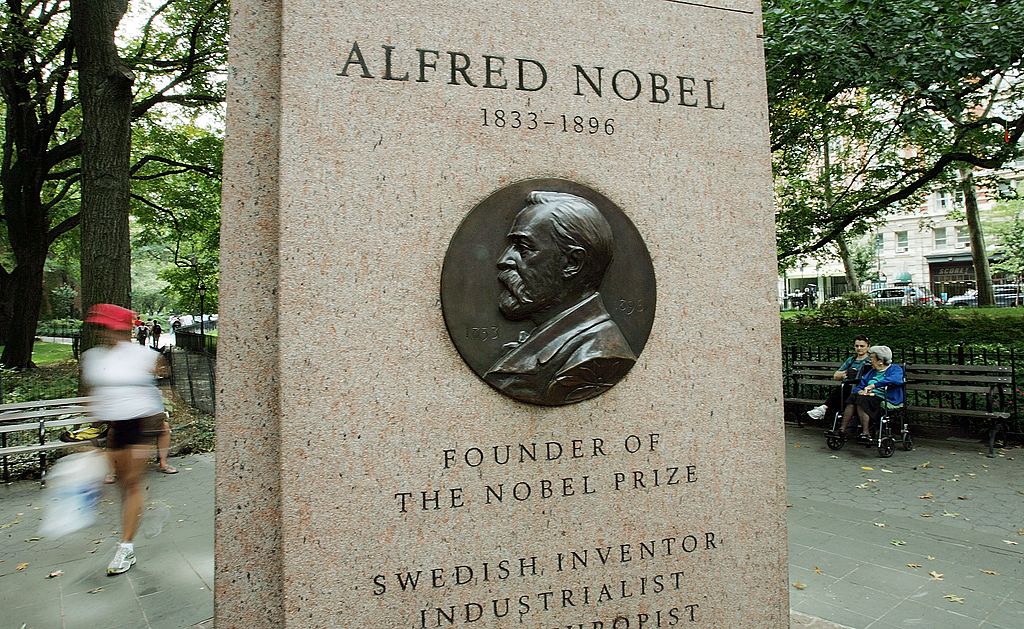Whether you know it or not, the 2023 Nobel Prizes have been awarded in physics, chemistry, medicine, and literature. And, of course, the most prominent and well-known, garnering most of the chatter, the peace prize. The prestigious nod for a job well done was once highly anticipated and well-received and on the tips of tongues at dinner tables everywhere. But few Americans today seem to care, and news coverage this past week focused on Donald Trump, Kevin McCarthy, and the never-surprising onset of war between Palestine and Israel.
Perhaps that’s because no American was deemed smart or brave enough to qualify.
The Nobel Peace Prize Goes to …
The Peace Prize is the most often discussed award, given 104 times to Nobel Prize laureates between 1901 and 2023. Individuals and organizations have claimed the right to display the 18-carat (fairmined) gold medal with the Latin inscription “pro pace et fraternitate gentium,” which translates to peace and fraternity among peoples. “Around the 5 mm thick edge are engraved the words Prix Nobel de la Paix, the year, and the name of the laureate,” the organization’s website explains. The winner also pockets a sizeable amount of cash (USD $912,437.89) and a Nobel diploma, a unique work of art for each recipient.
By anyone’s standard, Narges Mohammadi has earned this year’s most notable prize “for her fight against the oppression of women in Iran and her fight to promote human rights and freedom for all.” Mohammadi is in Tehran’s Evin Prison for various “misdeeds” relating to equality activism for Iranian women.
 Prominent Americans have also won peace prizes. In 2009, it was President Barack Obama “for his extraordinary efforts to strengthen international diplomacy and cooperation between peoples.” Okay, some may dispute the description, but nevertheless, he won. In 2002, former President Jimmy Carter was awarded “for his decades of untiring effort to find peaceful solutions to international conflicts, to advance democracy and human rights, and to promote economic and social development,” which is indisputable. Without question, Rev. Dr. Martin Luther King earned his “for his non-violent struggle for civil rights.”
Prominent Americans have also won peace prizes. In 2009, it was President Barack Obama “for his extraordinary efforts to strengthen international diplomacy and cooperation between peoples.” Okay, some may dispute the description, but nevertheless, he won. In 2002, former President Jimmy Carter was awarded “for his decades of untiring effort to find peaceful solutions to international conflicts, to advance democracy and human rights, and to promote economic and social development,” which is indisputable. Without question, Rev. Dr. Martin Luther King earned his “for his non-violent struggle for civil rights.”
Names familiar, such as former Secretary of State Henry Kissinger, Mother Teresa, and the 14th Dahli Llama, have also accepted the top prize.
The award for physics was granted to Pierre Agostini, Ferenc Krausz, and Anne L’Huillier “for experimental methods that generate attosecond pulses of light for the study of electron dynamics in matter.”
The medicine nod was given to Katalin Karikó and Drew Weissman for helping develop the COVID-19 vaccination, and Norwegian Jon Fosse took the title of literature laureate.
Why the Nobel Matters

(Photo by Mario Tama/Getty Images)
Alfred Nobel was a Renaissance man often called Europe’s richest vagabond. He was gifted by birth as a descendant of Olof Rudbeck, the premiere scientist in Sweden in the 17th century. He had a name, wealth, and education, speaking several languages fluently. Alfred Nobel greatly increased his wealth by creating dynamite and by holding 355 patents. Later in life and during his declining health, he joked that his explosive invention was inside his body for angina issues.
Nobel only wanted to encourage others to make a difference. He left his fortune ($245 million in today’s money) for the Nobel prize, as detailed in his last will and testament, which read: “to the person who shall have done the most or the best work for fraternity between the nations and the abolition or reduction of standing armies and the formation and spreading of peace congresses.” That sentiment says it all.



